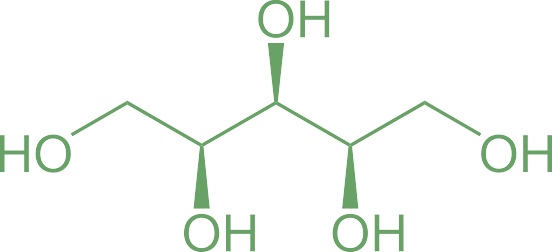
What is Xylitol
Xylitol (English. Xylitol) belongs to the carbohydrates and is assigned to the group of sugar alcohols. It is a sugar substitute that - in contrast to synthetically produced sweeteners (e.g. aspartame) - occurs naturally in vegetables, berries and other sources. Xylitol has long been known as a food additive and is used in tooth-friendly chewing gum, candies and toothpastes, among other things.
Characteristics
Anti-cariogenic effect:
Tooth decay is caused by bacteria (Streptococcus mutans) that convert sugar into harmful acids. Valuable minerals are removed from the teeth to neutralize these acids. This leads to the breakdown of the tooth substance, and so holes appear. This caries cycle can be avoided by using xylitol. Since the bacteria cannot digest the xylitol, no harmful acids are created. This means that tooth decay is countered at the cause.
Less plaque:
Dental plaque is made up of several layers of saliva, bacteria, minerals and food residues. The plaque, in turn, can lead to tooth decay and inflammation of the gums. Since the bacteria are deprived of their nutritional basis - i.e. conventional sugar - when using xylitol, the formation of dental plaque can be prevented or at least greatly reduced. After taking xylitol, the teeth feel smooth and freshly brushed for hours.
Stopping or even reducing tartar build-up : Excessive plaque turns into tartar through the incorporation of minerals. This forms a firm connection with the tooth. According to several experience reports, tartar is significantly reduced with regular xylitol intake.
Remineralization of the teeth:
sugar is acid-forming, xylitol, however, increases the basic value. As mentioned earlier, acids demineralize teeth. This in turn makes the teeth more vulnerable to bacteria and consequently promotes tooth decay.
The body is able to remineralize teeth affected by tooth decay through the saliva itself. Xylitol stimulates the production of saliva. This contains calcium and proteins (from food) with which the xylitol combines to form complexes. This makes it easier for these substances to be stored back in the tooth substance. The remineralization is additionally strengthened by xylitol.
Obesity & Diabetes:
In contrast to sugar, xylitol goes through the metabolism without the body needing insulin. Therefore the blood sugar level only increases slightly (glycemic index = 7). This means that xylitol is also suitable for diabetics! In addition, we can confirm from our own experience that the cravings for sweets with xylitol clearly decrease. It contains approx. 40% fewer calories and 85% fewer carbohydrates than sugar and is therefore suitable for a figure-friendly diet.
Side effects:
Xylitol is approved without any maximum amount restrictions and is safe for both children and adults, even in larger amounts. A daily limit of 0.5 grams per kilogram of body weight is recommended. If consumed in excess, it may have a laxative effect. The tolerated dose is individual. However, the human body is able to get used to larger amounts of xylitol within a few days. Therefore, the laxative effect, if it occurs at all, is short-lived.
Note: in the case of intestinal disorders such as colitis, the tolerance may be very poor. Xylitol is unsuitable for animals! They have a different metabolism than we humans and therefore cannot tolerate xylitol.
You can find detailed information about xylitol on our blog: www.xylosan.info . If you have any questions or suggestions, you can add a comment under the respective article. So all readers benefit from the exchange!
